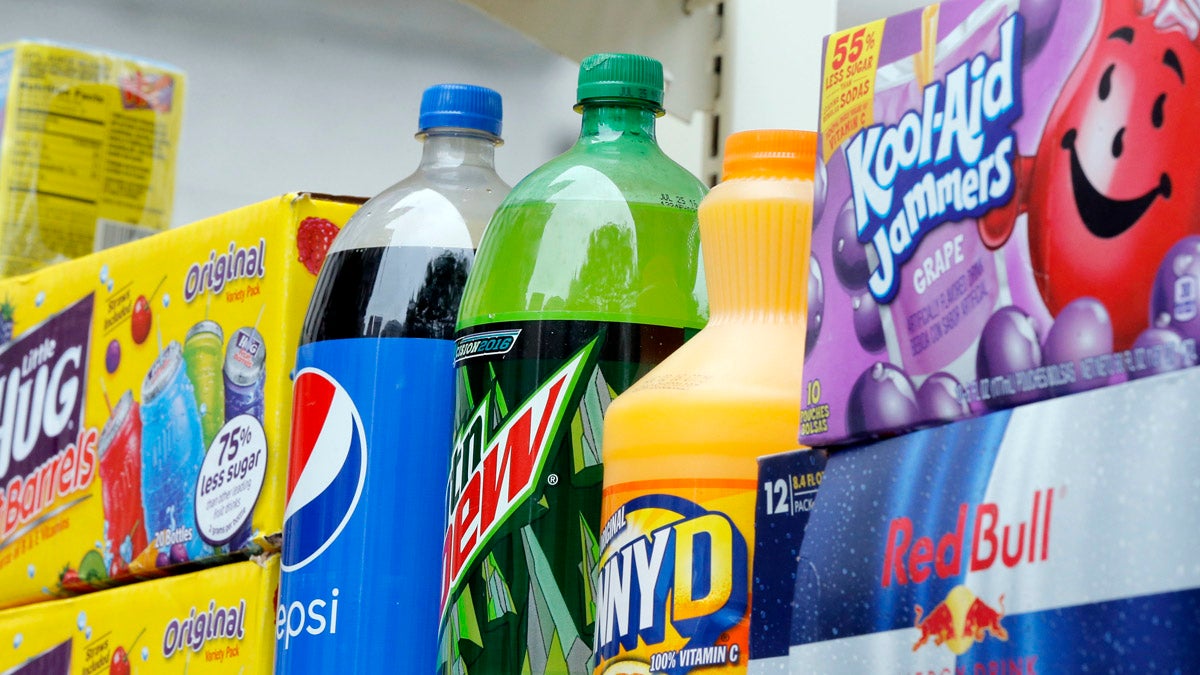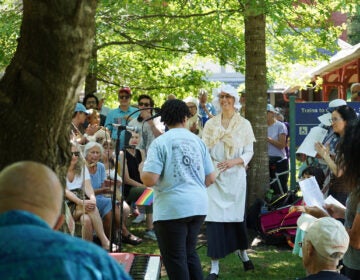Kenney team honing arguments in case of legal challenge over drinks tax

A delivery truck outside Independence Visitor Center on Sixth Street carries an ad against Philadelphia's proposed sugary drink tax. (Katie Colaneri/WHYY)
Even if Mayor Jim Kenney is able to persuade City Council to approve his 3-cents-an-ounce soda tax proposal, there will likely be another fight awaiting him.
The response to potential lawsuits aimed at blocking the mayor’s bold plan for funding universal prekindergarten and supporting improvements to Philadelphia’s parks and libraries is being calculated by a team of attorneys drafting a legal defense strategy.
It comes on the heels of city solicitor Sozi Tulante’s internal memo to the mayor in March, obtained by WHYY/NewsWorks, stating he has a “high degree of confidence” that the city can survive any legal brawls on the horizon.
“If there’s a lawsuit with respect to this, we’ll be prepared,” Tulante said in an interview.
The city will be able to deflect at least two possible legal arrows, according to his memo.
The first is that critics might argue that it’s a duplicate sales tax. The state already taxes sugary drinks, so the city can’t do it, too, without a specific authorizing statute, the logic goes.
Tulante has a creative answer.
“It’s not a sales tax,” he said. “For a couple of reasons. One, the tax here would be imposed on the distributor or retailer, not on the consumer.”
What’s more, the levy is based on volume, not on price. Under a strict reading of state law, that’s not a sales tax, Tulante contended.
“There is no city ‘intent’ that the tax will be borne by the consumer, nor is there any evidence that it will be borne by the consumer,” Tulante wrote in his memo to Kenney. “I believe a court would focus on the legal incidence of the tax, rather than the manner in which market forces allocate the tax.”
Larry Ceisler, with Philadelphians Against the Grocery Tax, insists that a much simpler analysis should apply.
“If it quacks like a tax, it’s tax,” he said.
No matter, it should be up to a court, not the mayor, to decide, Ceisler said.
Adam Finkel with the University of Pennsylvania’s Law School and an expert on government regulations said the end-of-the-day result of the plan would be a price hike on sugary drinks.
“It’s always going to be passed through to consumers no matter where you levy it,” Finkel said. “So that’s not the distinction I would make.”
Zach Cowan, the top attorney for the city of Berkeley, California, which passed a 1-cent-per-ounce soda tax, said the cost to consumers shouldn’t be a foregone conclusion.
“That depends on a choice made by distributors,” he said. “I’m not buying the argument that ‘the devil made me do it, my hands are tied,'” Cowan said. “Government exists to advance the public welfare, and distributors are in business to make money. That’s a significant difference.”
A just tax?
Tulante wrote that the second possible legal vulnerability of the soda tax, or “the sugar-sweetened beverage tax,” as the administration calls it, could involve the question of whether it’s arbitrary. Under the state’s Constitution, a single item can’t be unjustly singled out and taxed, invoking what attorneys know as the uniformity clause. But the clause does have flexibility, Tulante pointed out, as long as the new tax is “just.”
Which then raises the question, is it just to tax soda and other sweet drinks?
“I think the answer is fairly obviously — yes, because of all the health deficits associated with the sugary drinks,” Tulante said in a phone interview.
Because drinking a lot of sweet drinks is associated with increasing the likelihood of diabetes and obesity, the city has a justification, said Tulante. This is a notable argument because the mayor hasn’t been emphasizing the proposal’s potential health benefits.
In 2010 and 2011, Mayor Michael Nutter pushed for a 2-cents-per-ounce soda tax to fight obesity and generate new city revenue. The measure failed each time. Back then, Kenney was opposed to taxing sugary drinks.
California doesn’t have a similar uniformity law, said Berkeley’s Cowan, so the city never dealt with a challenge along those lines. In fact, the only lawsuit leveled at the city over its 2014 soda tax dealt with perceived bias in the language of the ballot imitative. A judge tweaked the language following the suit. The measure later passed with 76 percent of voter support.
Meanwhile, Ceisler said the city being on the defensive about litigation makes one thing clear.
“Obviously, the administration is very concerned about the legality of the tax,” he said.
By not calling it a sales tax and saying it’s a special case, the city is engaging in a public-relations exercise, he said.
“They have to sell it to the public. And, the fact is, they know from their own polling that residents of this city feel taxed out,” Ceisler said.
The Kenney administration, in response, asked where else is the city to find the cash to fund pre-K for all city children and spruce up parks and libraries across Philadelphia?
Surprises may be in store
It’s too soon to say whether the final version of the soda tax proposal will follow the state’s Constitution and other commonwealth law indisputably. But even if the city feels it is beyond reproach, critics are all but certain to test the city’s authority to impose the new tax in the courts.
While the Kenney team is ready to respond on two legal fronts, opponents say it should also be ready for surprise.
In other cities, lawsuits, or the threat of legal action, have stymied taxing or banning soda products.
A recent soda tax proposal in Chicago failed not only in the face of fierce opposition from the soda lobby, but also because city officials worried that it wouldn’t withstand a legal challenge. And in New York, a state appeals judge sided with the soda industry and struck down former Mayor Michael Bloomberg’s push to ban big sugary drinks as “arbitrary and capricious.”
Ceisler said there may be possibilities beyond what the city’s top attorney is anticipating.
“The legislation is still a moving target,” Ceisler said. “It’s hard to draft a legal argument when you don’t know what you’re arguing against.”
WHYY is your source for fact-based, in-depth journalism and information. As a nonprofit organization, we rely on financial support from readers like you. Please give today.




